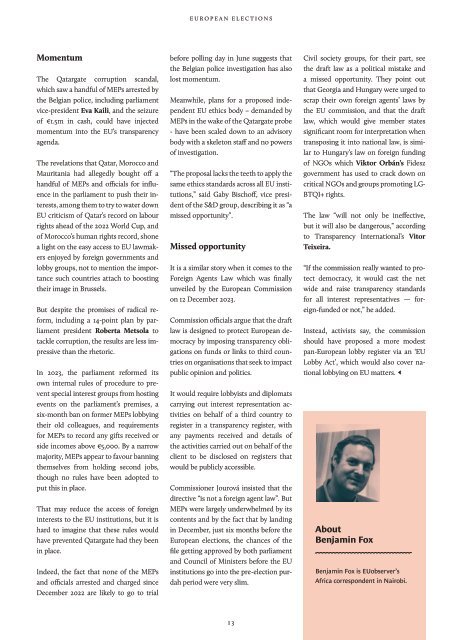EU Elections
EUobserver's guide to the 2024 European Parliament Elections.
EUobserver's guide to the 2024 European Parliament Elections.
- No tags were found...
You also want an ePaper? Increase the reach of your titles
YUMPU automatically turns print PDFs into web optimized ePapers that Google loves.
<strong>EU</strong>ROPEAN ELECTIONS<br />
Momentum<br />
The Qatargate corruption scandal,<br />
which saw a handful of MEPs arrested by<br />
the Belgian police, including parliament<br />
vice-president Eva Kaili, and the seizure<br />
of €1.5m in cash, could have injected<br />
momentum into the <strong>EU</strong>’s transparency<br />
agenda.<br />
The revelations that Qatar, Morocco and<br />
Mauritania had allegedly bought off a<br />
handful of MEPs and officials for influence<br />
in the parliament to push their interests,<br />
among them to try to water down<br />
<strong>EU</strong> criticism of Qatar’s record on labour<br />
rights ahead of the 2022 World Cup, and<br />
of Morocco’s human rights record, shone<br />
a light on the easy access to <strong>EU</strong> lawmakers<br />
enjoyed by foreign governments and<br />
lobby groups, not to mention the importance<br />
such countries attach to boosting<br />
their image in Brussels.<br />
But despite the promises of radical reform,<br />
including a 14-point plan by parliament<br />
president Roberta Metsola to<br />
tackle corruption, the results are less impressive<br />
than the rhetoric.<br />
In 2023, the parliament reformed its<br />
own internal rules of procedure to prevent<br />
special interest groups from hosting<br />
events on the parliament’s premises, a<br />
six-month ban on former MEPs lobbying<br />
their old colleagues, and requirements<br />
for MEPs to record any gifts received or<br />
side incomes above €5,000. By a narrow<br />
majority, MEPs appear to favour banning<br />
themselves from holding second jobs,<br />
though no rules have been adopted to<br />
put this in place.<br />
That may reduce the access of foreign<br />
interests to the <strong>EU</strong> institutions, but it is<br />
hard to imagine that these rules would<br />
have prevented Qatargate had they been<br />
in place.<br />
Indeed, the fact that none of the MEPs<br />
and officials arrested and charged since<br />
December 2022 are likely to go to trial<br />
before polling day in June suggests that<br />
the Belgian police investigation has also<br />
lost momentum.<br />
Meanwhile, plans for a proposed independent<br />
<strong>EU</strong> ethics body – demanded by<br />
MEPs in the wake of the Qatargate probe<br />
- have been scaled down to an advisory<br />
body with a skeleton staff and no powers<br />
of investigation.<br />
“The proposal lacks the teeth to apply the<br />
same ethics standards across all <strong>EU</strong> institutions,”<br />
said Gaby Bischoff, vice president<br />
of the S&D group, describing it as “a<br />
missed opportunity”.<br />
Missed opportunity<br />
It is a similar story when it comes to the<br />
Foreign Agents Law which was finally<br />
unveiled by the European Commission<br />
on 12 December 2023.<br />
Commission officials argue that the draft<br />
law is designed to protect European democracy<br />
by imposing transparency obligations<br />
on funds or links to third countries<br />
on organisations that seek to impact<br />
public opinion and politics.<br />
It would require lobbyists and diplomats<br />
carrying out interest representation activities<br />
on behalf of a third country to<br />
register in a transparency register, with<br />
any payments received and details of<br />
the activities carried out on behalf of the<br />
client to be disclosed on registers that<br />
would be publicly accessible.<br />
Commissioner Jourová insisted that the<br />
directive “is not a foreign agent law”. But<br />
MEPs were largely underwhelmed by its<br />
contents and by the fact that by landing<br />
in December, just six months before the<br />
European elections, the chances of the<br />
file getting approved by both parliament<br />
and Council of Ministers before the <strong>EU</strong><br />
institutions go into the pre-election purdah<br />
period were very slim.<br />
Civil society groups, for their part, see<br />
the draft law as a political mistake and<br />
a missed opportunity. They point out<br />
that Georgia and Hungary were urged to<br />
scrap their own foreign agents’ laws by<br />
the <strong>EU</strong> commission, and that the draft<br />
law, which would give member states<br />
significant room for interpretation when<br />
transposing it into national law, is similar<br />
to Hungary’s law on foreign funding<br />
of NGOs which Viktor Orbán’s Fidesz<br />
government has used to crack down on<br />
critical NGOs and groups promoting LG-<br />
BTQI+ rights.<br />
The law “will not only be ineffective,<br />
but it will also be dangerous,” according<br />
to Transparency International’s Vitor<br />
Teixeira.<br />
“If the commission really wanted to protect<br />
democracy, it would cast the net<br />
wide and raise transparency standards<br />
for all interest representatives — foreign-funded<br />
or not,” he added.<br />
Instead, activists say, the commission<br />
should have proposed a more modest<br />
pan-European lobby register via an ‘<strong>EU</strong><br />
Lobby Act’, which would also cover national<br />
lobbying on <strong>EU</strong> matters. ◄<br />
About<br />
Benjamin Fox<br />
Benjamin Fox is <strong>EU</strong>observer’s<br />
Africa correspondent in Nairobi.<br />
13

















